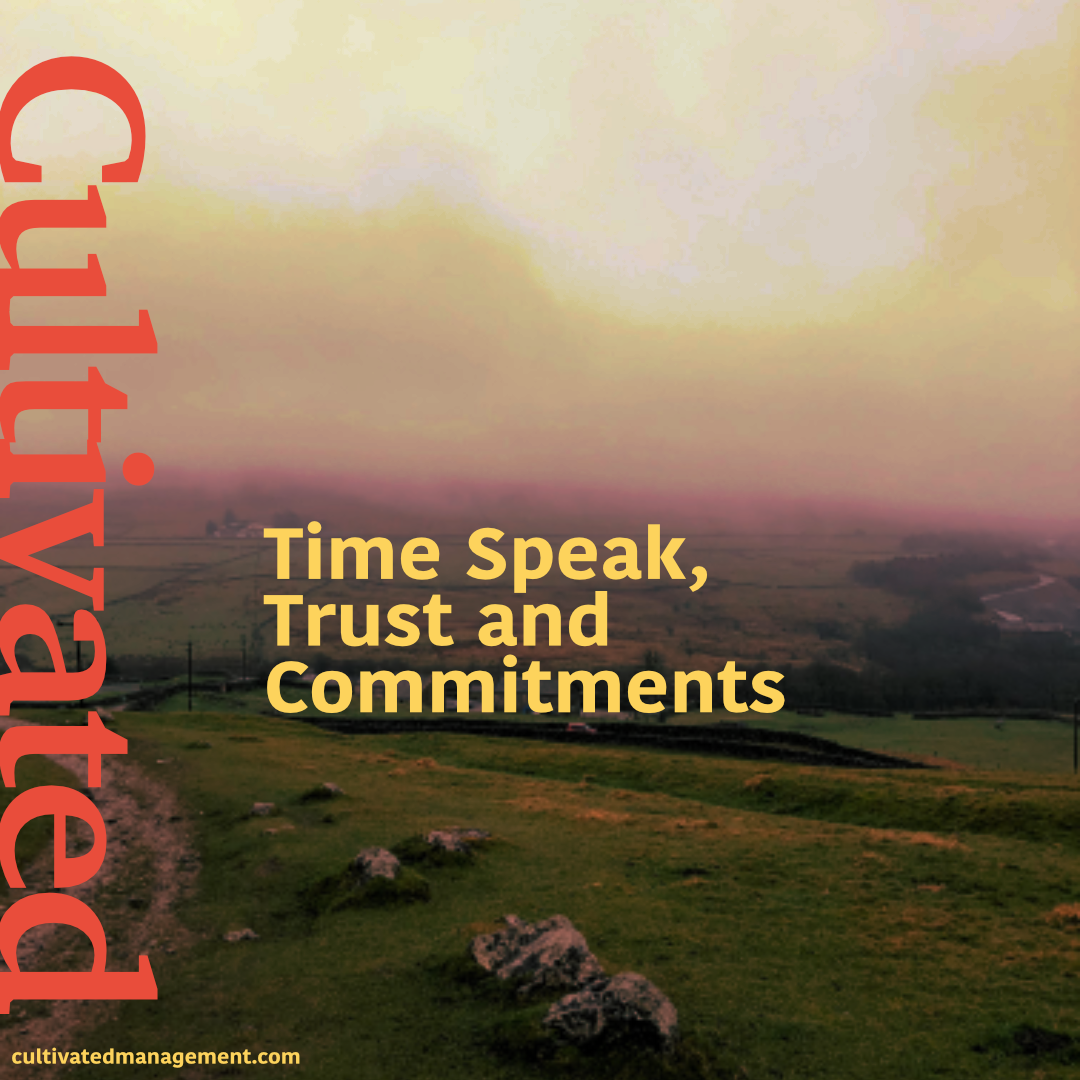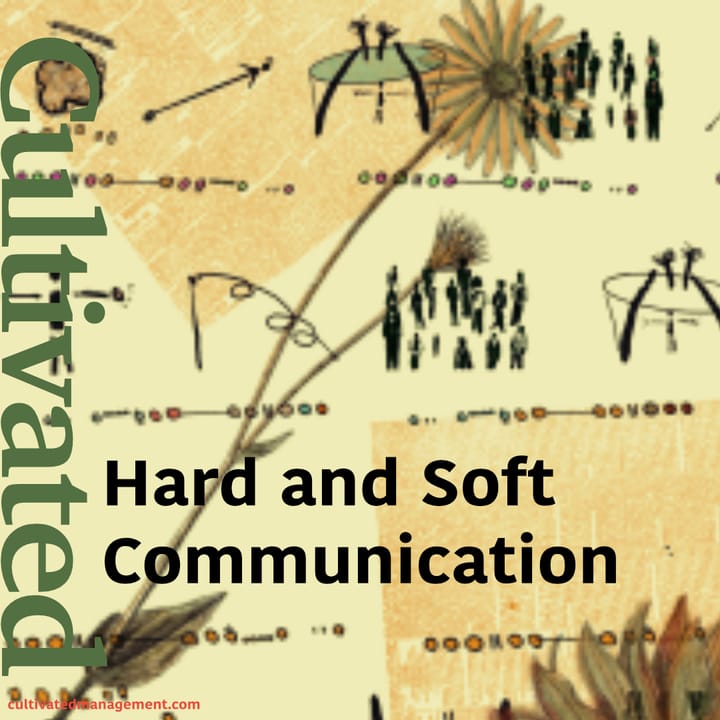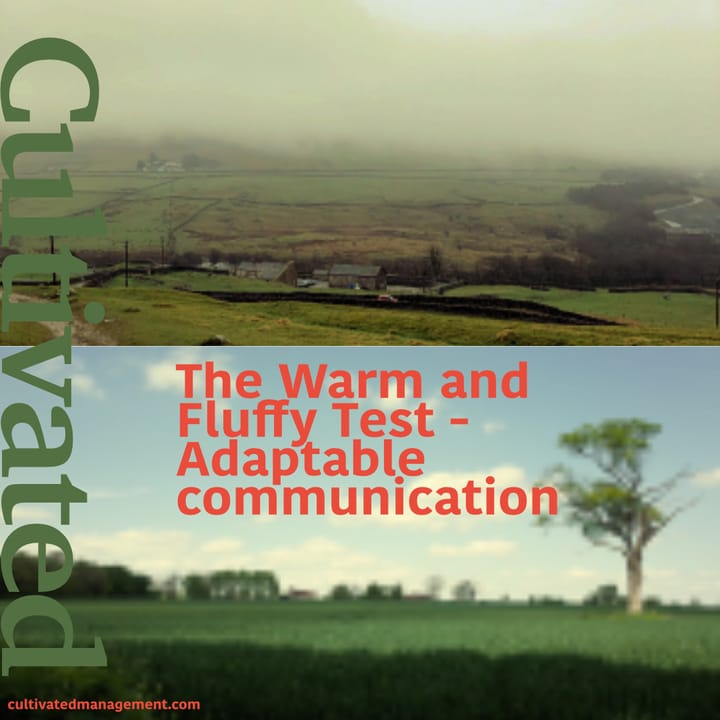Be clear on commitments and build trust using Time Speak
In this edition of Meeting Notes, I share advice on using time speak as a way to bolster commitments and build trust.

Hey,
I hope you are safe and well. Welcome to another edition of the free Meeting Notes newsletter.
I’m writing this in bed. I have Covid. My hard changing nature assumed, like the last time I had it, I would only need a day off work. Not this time. Day 2 and still feeling rough, but thought I’d get this newsletter written, take some meds and go back to bed.
For those new to the Meeting Notes newsletter, welcome, I’m Rob, Chief Wellness Officer at Cultivated Management. This newsletter is about envisioning bright futures of work, as well as tips and advice on cultivating yourself, learning and the super power that is effective communication.
In today’s newsletter I will share some rock solid advice I learned about 25 years ago on a Mary Gober Customer Excellence training course.
Before then though, I thought I’d let you know that I clicked “print” on 100 copies of Zero to Keynote. It’s at the printers now. I spent a little more time (and money) than usual to ensure gloss pages (for protection) and a higher quality cover (my proof copy was showing creases too soon). It’s a little geeky pulling together a book with so many options!
The copies should be arriving later this week - and I’m hoping to have it on my Etsy store next week alongside Take a Day Off.
I’ve also reduced the price of the online Super Power workshop slightly. There’s also the paid newsletter which will niche down on personal cultivation, communication and creativity too.
I had a realisation, laid in bed with Covid, that I called my company Cultivated for a reason. It was originally created to help leaders and managers (and anyone else interested) in personal cultivation and learning.
To Cultivate means “to improve through study or labor, devotes one’s attention to”.
I’ve kind of lost my way a little over the last few years and moved away from this focus on learning. I’ve since put my focus back on why I started writing and consulting in the first place; to help people learn and grow and cultivate themselves in line with their goals and who they are.
Anyhow. Let’s jump into the topic today - time speak.
Time Speak
Picture the scene. I’m a lot younger and still living in the North of England, in Leeds. I’d recently graduated from Sheffield Hallam University in my home city; the city of steel.
I was working for a cool company building school administration software and working with a really cool bunch of folk.
We’d managed to secure some budget for a training course from the legendary Mary Gober International. We bundled on a coach and headed down to the majestic Blenheim Palace, ancestral birthplace and home to Winston Churchill.
This was an adventure for me as I’d rarely ventured south of Nottingham. We arrived the night before and stayed in a posh hotel just outside of Oxford. The following day we arrived at the Palace. I was blown away with how impressive it was. Grand is an understatement. We were ushered into a swanky room, dosed up with coffee and taught a variety of techniques for better customer service.
Many of these techniques have been foundational to my career but one stood out; Time Speak.
As a side note, the reason I was inspired to write about this all these years later, is because I was clearing out my filing system and found the certificate from the event!
One technique that stood out that aligns with one of my core 10 behaviours of effective employees is “time speak”.
I have a behaviour I try to role model and look for in others - and it’s doing what you say you will. If you commit to something, do it. Or at least communicate early why it may not get done.
By doing what we say we will do, we build trust. We break trust when we let people down. It also helps us to form critical thinking and analysis, so that we aren't tempted to commit to something we know beforehand that we cannot do.
When we say we will do something, we should do it.
And time speak is a linguistic construct that Mary Gober taught us, to help us commit to things.
In a sense, instead of merely saying we will do something, we commit even further by giving a time dimension to it.
For example, in customer service, instead of telling a customer you will call them back, say when you will call them back. And even if you don’t have any update that resolves their issues, you should still call them back when you said you will.
If you’re delivering a report - tell people when you will deliver it. Give a specific date and time.
When you’re working with your colleagues, commit to a date and time on delivery of your work.
“I will call you back on Thursday morning” is much more powerful than “I will call you back this week”. Even better would be "I'll call you back on Thursday at 11am if that works for you".
“I will send you the details in the next few weeks” is a weak commitment. Be more specific and orientate your work or calendar around delivering. “I will send you the details on Friday afternoon of this week” is better.
By using Time Speak you are showing a commitment to the other person. You then get a chance to develop the positive behaviour of delivering on what you said you would - versus coming up with reasons not to. And when we’re not specific about time we give ourselves a way out.
By using Time Speak we’re also building the muscle of thinking through our actions and their consequences, and developing the behaviour of being brave (another of my 10 behaviours).
For example, if someone asks you to do something and you know it will be a big piece of work, you’re going to need to be clear about when it can be done. Sure, sometimes there is a deadline set but if we really can’t get it done (at least to the right quality) by the deadline, we’re going to need to be brave and challenge this. “I cannot do that presentation by Wednesday as the work involved is huge, but, I will be able to have this done by Thursday afternoon”.
I have to do this all the time. Unreasonable requests should be met with reasonable challenges. And Time Speak.
If you do this often enough you’ll make it part of who you are. It’s ingrained in my own language and approach now, but it took a few months to practice this technique.
I even now expect and request the reverse of this.
I was on a call with my studio insurance company the other day and the agent said they’d call back at some point over the next week. I asked them to be more specific and give me a day when they would call.
It may seem unreasonable but they came back immediately with a date and time. And they called on that date and time. It wasn’t that they couldn’t commit to Time Speak, they’d just never been taught how important it is.
There’s a reason that high performing companies give you specific delivery times for parcels, or call backs, or commitments, or work. It’s because it works and it builds trust when they do indeed deliver or call on time.
The same principle applies in work. Use Time Speak to make commitments, and then deliver on the commitments. If you don’t believe your commitment, then don’t commit.
Respect for being who you are is given by default (or should be) but trust is earned. It’s earned by doing what you say you will and Time Speak is a good technique to try. Trust is broken by breaking commitments - so again, use Time Speak to give a commitment that is realistic - and deliver on it.
The idea of Time Speak has stuck with me for years and is a powerful way to communicate actively, clearly and directly. It’s also a way to build trust. And it’s also a way of developing the muscle of challenging unreasonable deadline requests, and developing the behaviour of doing what you say you will.
With that, I’m going to have some more medicine and get some sleep. Take care of yourselves.
Rob..
From the cultivated editorial desk
- Creating a space to do "this" work. Why having dedicated spaces for certain work can be so important.
- Why DISC is so important for energy management. DISC is a good tool for preferences and communication styles, but it's also an important personal tool for energy management.
- Why everything starts with a vision.
- The 10 elements of a good workshop or tutorial (podcast).
- A fun stop motion video capturing a day in the life of....me. 1600 individual photos made this stop motion.
- I've re-edited and re-released my classic free short story about company dysfunctions called The Diary of a Manager.
- New YouTube video on the power of clothing on first impressions AND our own ability to get better work done.
- Imagine there is a book being written about the company you work for. It started when the company started and your time there is a series of chapters in the book. What would you want your chapters to be? (podcast)
A link worthy of energy and attention
I’ve cut my teeth in tech companies and still believe tech companies can be a force for good. But, I’ve always been skeptical of the “growth at all costs” model. After all, what’s wrong with small to medium businesses? It’s a lot to do with power and money of course. But surely it's also important to do the right things for staff and society?
Well, Ed Zitron is a writer that’s worth checking out. He’s one of a few voices who is asking critical questions about the tech world, tech leaders and the vast money being plowed into AI - and his newsletter is an eye opening thing to read.
This week’s edition is a good one. Worth a subscription if you’re skeptical or critical of the growth at all costs culture. Or the media singing the praises of seemingly awful people without critically challenging what is said. Or the lack of scrutiny over the lies many tech leaders are spewing.
Insightful, critical and vocal.
If you enjoyed this newsletter then please consider:
- Sharing this content with others you feel would get value from it.
- Downloading the free ebook 10 Behaviours of effective employees.
- Buying the “Take A Day Off” zine for an insightful read and cool artwork
- Sitting the online communication workshopto develop your super power in work.
It means a lot. Thank you.
Rob..



